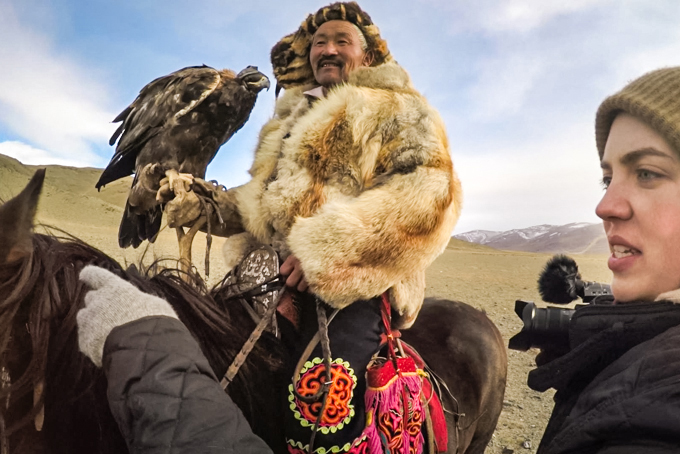
Ansley Sawyer is a producer with Brandon Li, whom you may recall, was the cinematographer on my Guam documentary. In 2015, I interviewed Brandon about life on the road, including the misconceptions and myths about digital nomadism. Now you can read my candid interview with Ansley, a millennial whose Facebook check-ins inspire a flurry of envious comments among her friends. She is a woman on a mission, but what I like about her approach is that she soberly faces up to the discomforts of the unique lifestyle she’s chosen.
How do you make a living traveling?
I’m a travel film producer. Right now I work with Brandon Li over at Unscripted.com. We work with production companies and directors to make web media — and we make some pretty cool stuff. Recent collaborations include “Nomads of Mongolia,” and an upcoming film about Chinese New Year in Hong Kong.
I’m Brandon’s producer and assistant. I’m responsible for writing new series and videos, casting talent, editing footage, organizing what Brandon wants for pre-production of major projects, and facilitating production of current shoots. We’re a growing two-person company, so it’s a big undertaking to build a brand around relevant and inspiring creative work.
This means I don’t have a set place to live in — I’m what some people call a “digital nomad.”
[slogan]I don’t have a closet, car, or an apartment, but I do have a 55-liter backpack full of camera equipment[/slogan]
Brandon and I have worked and traveled together on-location, but most of the time we work together online. That means that I can work remotely anywhere, as long as I can get work done everyday on a number of ongoing projects. I generally move cities every 3-4 weeks.
What are some common misconceptions about digital nomads?
Mostly that our lives must be really exciting because of all the travel.
Sometimes I’ll luck out and find an Airbnb for $15/night next to a beach somewhere, but when that is possible I rarely have time to enjoy it. Like most startups, everyday is a workday, so weekends and weekdays sometimes blend together into a big jumble of unfinished projects. It’s not uncommon to wake up way early for a conference call with someone 12 time zones away. That same level of unpredictability makes my life exciting, but it also means I have no idea where I’ll be in a month, personally or professionally.
[slogan]Most of the time I’m in a hostel room with 7 other people, or sleeping on someone’s couch.[/slogan]
It’s nice to just pack up and leave whenever I feel like it. But more often than not I don’t have a lot of control over my schedule. Sometimes Brandon wants me in Hong Kong immediately, or the project DP lives in Seattle and can’t travel. I have to be ready to pack everything up at a moment’s notice so I can meet deadlines. My plans for the immediate future change on a daily basis, and it can be hard to find consistency amongst all that adventure.
Now for the biggest misconception: I mostly live outside of the United States. This does not mean I’m in constant danger.
My attitude is that if I do something stupid, I will get in trouble. So I am constantly aware of my environment, I take necessary precautions for my security, I’m culturally sensitive, and people tend to leave me alone. I find this misconception to be a little paranoid, honestly, and people abroad always make fun of Americans for it. It’s a pretty unique (and totally unfounded) mindset in which we combine our weird fascination with violence, our fear of the unknown, and our gullible willingness to believe that the rest of the world hates us. Honestly, the rest of the world doesn’t care. Also, it’s really selfish of us to assume that America is the greatest and safest place on earth — Philadelphia is probably the most dangerous place I’ve ever lived.
This misconception would be funny, if it didn’t contribute to a dangerous misunderstanding of how the rest of the world works. This builds resentment, and it makes it that much harder to actually connect with non-Americans.
What I’m trying to say is this: life is pretty much the same everywhere. People in Mongolia and Myanmar and Mexico and Morocco all want to make and keep good friends, earn a fair wage, be a part of some greater community, and stay out of trouble. Anyone’s life can be spontaneous and exciting, or it can be unfulfilling and stressful — it’s all about your attitude.
[convertkit form=4904119]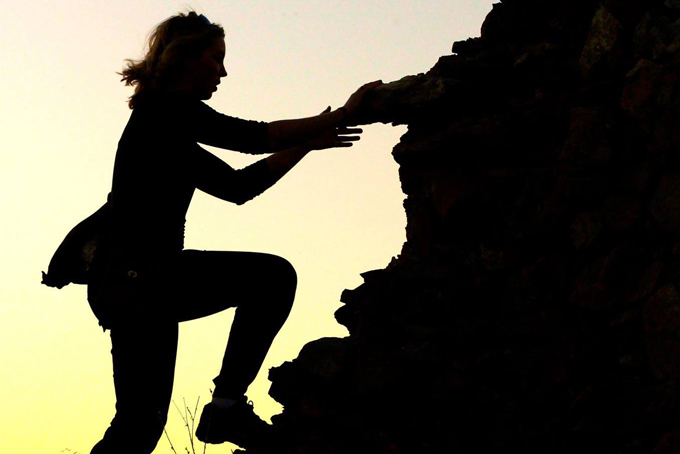
How long did it take you to make digital nomadism profitable and sustainable as a career?
You know, I spent several years working one odd job after another just to stay on the road. I au paired in France, spent a few seasons working as a sailor in Greece, sang in jazz clubs, busked in the metro, did a short stint at an investment company in Seattle, did some photography freelancing, bartending…everything. I even co-founded a theatre company in France. It all sounds glamorous, but without exception each of these experiences have ended mostly in failure. I can’t remember every instance of some boss refusing payment, or when I made work I wasn’t proud of. Sometimes social conflicts within a group caused a breakdown, and there have been lots of disappointment. It’s hard to see through all that smoke, and to focus on how to make intentional changes to live a better life.
Right now, I’m working on material that interests me. I like working, a lot. I’m really lucky to have identified one niche that interests me and that I’m learning from. Sometime in the near future, I’ll probably plateau and try to find a new challenge, but for now the possibilities for my career are really exciting. I guess I’m getting paid, so that aspect means my work is sustainable. But that’s not really the point.
Making travel the defining characteristic of your lifestyle will never really be sustainable, because it takes a constant stream of energy to maintain. You have to focus on not only building your professional skills, but also just surviving and not constantly losing it. I’m the kind of person who is fascinated by the challenge of constant adaption. It’s like playing life on expert mode. The only thing that really sustains or satisfies me is the feeling I get when I start to crack the code on a new culture, gaining insight to a language or event that before I could only witness as an outsider. Concurrently making progress with my job is even better.
[slogan]Traveling and working at the same time is not a sustainable lifestyle…[/slogan]
Learning, growing, and producing a large body of relevant work while satisfying your curiosity about the world is. A lot of travel bloggers encourage quitting your day job and traveling the world, but very few people ever make that happen.
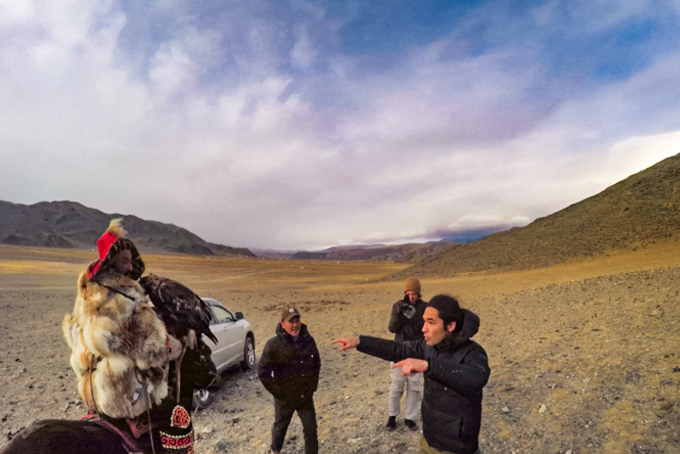
What do you think is the key to success as a digital nomad?
I have very little job security in a non-permeable industry in which women are vastly underrepresented. Because I work outside the realm of any structured office, whatever success I achieve comes at great personal risk and cost. I’m consistently staking my resources and time on delivering high quality work, and I have basically no job security. I wouldn’t really recommend that lifestyle to anyone unless they had a gut feeling that that is the only thing that would make them happy.
I’m also extremely lucky to have matriculated without any debt, and I have no dependents. In that regard I’m privileged and can make decisions that other people could never consider. Still, I’ve had to make a lot of decisions along the way about what kind of lifestyle I want for myself, and it’s often at odds with what my peers are doing or what society expects me to do.
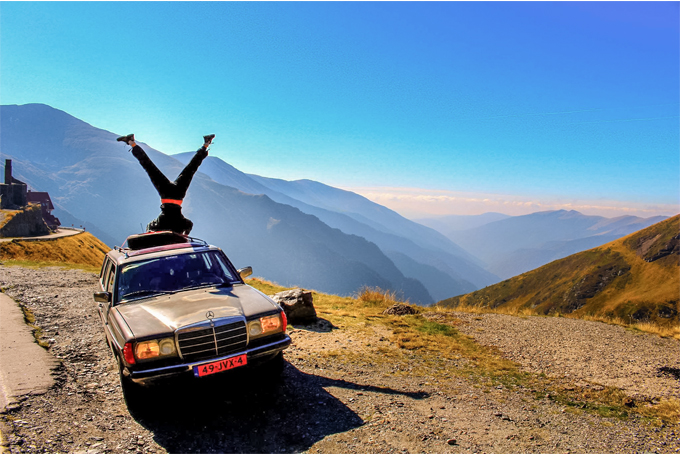
It’s all about envisioning what would make you happy, figuring out what makes other people happy, and then following through until you make your own flavor of happy.
Also, I’ll say this: Going DN is not about the satisfaction of turning in your resignation notice. Pursuing this lifestyle requires a lot of focus. No one would care if you maxed out your credit cards and buried yourself in debt after quitting your job. There are real rewards to this lifestyle, but you should also be aware of the risks, especially if you’re just interested in the allure.
If you’re working an unsatisfying day job, really ask yourself if the nomad lifestyle is right for you. I can honestly say that it’s not right for everyone — some people cannot deal with the sacrifice and concentration it requires. But once you’ve gotten over the mental barrier of what’s at stake, it’s honestly just easier to go for it. Life continues pretty much normally after you quit your normal job. If you have a feeling you’d be good at it, you’re probably right. The only way to test it is to jump in. If you wish to stay in Toronto and look for a condo, see this.
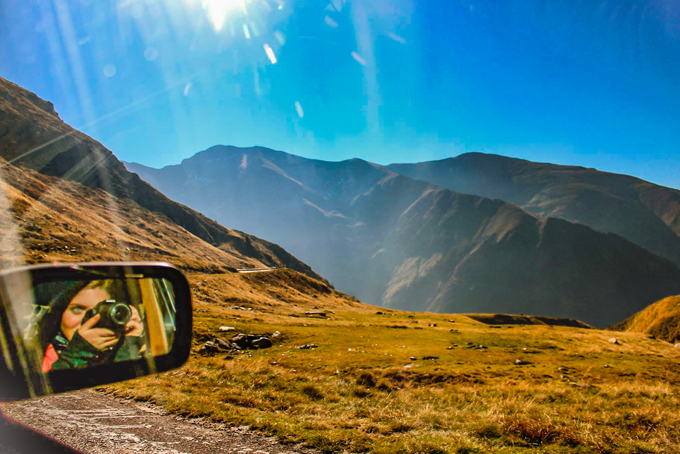
Any cautionary tales or triumphs?
When I figured out that I wanted to get into this industry, I just started immersing myself in travel films. I wanted to combine my performance experience and passion for storytelling with my travel experience. I wanted to find someone whose work was obviously better than what I could ever produce without additional materials or training. I wanted to work, hard.
Brandon’s work jumped out at me. I emailed him, he needed help, and now we work together.
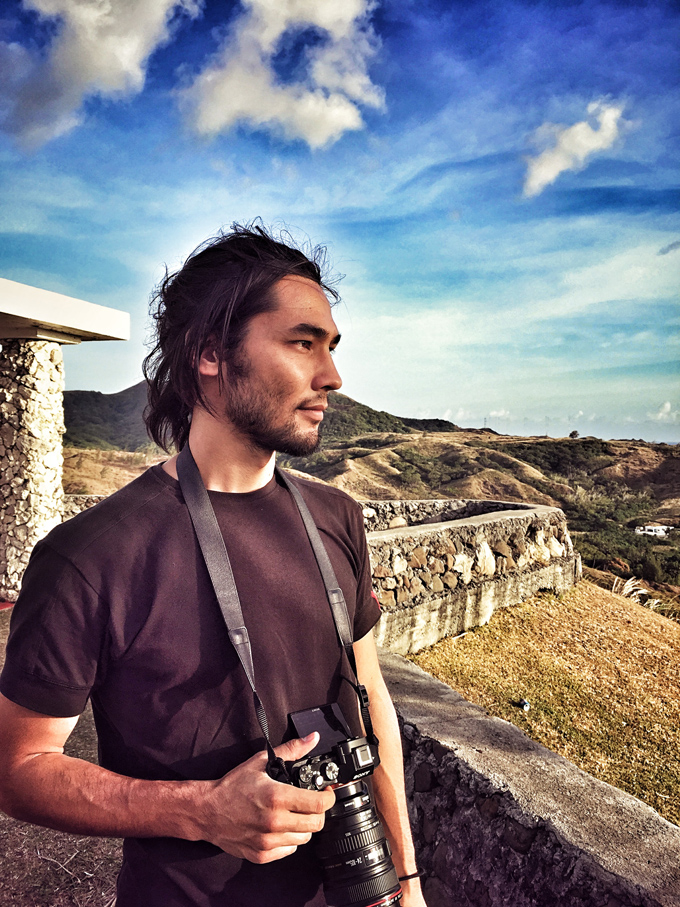
If you’re the kind of person who feels physically uncomfortable staying in one place, don’t. I happen to be one of those people. I get itchy after about 3 months in a city. I start to feel like I’m slipping into old habits or that I’m losing my edge. This might be strange, but I’m an introvert who really just likes to hang out with strangers. Then the strangers become my friends, we get really close over the course of two weeks, and then I leave town for another project or event.
That cycle used to really freak me out. None of my friends or peers from back home have pursued this lifestyle. Even more importantly, I was really worried about hurting the people I cared about. I really limited my options for myself — I could either be unhappy at home with the people I love, or I could explore the world solo. This caused me to do some very stupid things in many relationships. My truth is that neither scenario is realistic, and pushing people away benefits no one.
Now I know a little bit better that life is complicated for everyone. If your friends really love you they’ll be happy to see you once or twice a year. The important people stay close through it all. Don’t get distracted by the unknowns, because there are a lot of unknowns. Just follow your gut and the rest will work itself out.
How has your career choice affected your world view and your relationships?
As you can probably guess, keeping and maintaining relationships with this level of uncertainty is really, really hard. I don’t have a tight-knit friend group because I’m generally not around for more than a month. It’s really hard to find the time to visit my boyfriend. There are lots of people around the world that I care a lot about, but it’s impossible to maintain each of those relationships with any regularity. It makes me sad sometimes, but I don’t really get lonely.
I end up making very intentional choices about how I spend my time, and who I spend it with. I can either spend this month researching my independent film in southern Burma, or I can be with my family and boyfriend back in Philadelphia. If I can’t spend time with my friend in New York now, I can make a point to come back in May to see her. Unless I make great strides to see the people that matter to me, the opportunity will not come up.
But you know what? I think that’s always pretty much the case. You might live in the same town as your best friend from sophomore year, but you probably won’t hang out unless you make an effort.
[slogan]As for my world view, I judge people a lot less, especially in very foreign cultures…[/slogan]
There is so much more going on underneath the surface. It is almost always too soon to judge. It’s always better to listen.
What are the steps to making a career as a digital nomad?
First of all, get used to the idea that you may never hit your mark. Just because you’re working in a non-traditional environment doesn’t mean you can bypass the ladder to success.
[slogan]There are 500 people in Islamabad who are more motivated to deliver faster than you can.[/slogan]
Think critically about what you are actually passionate about. Let’s say you’re hot for ethnobotanical research. Find people whose work you admire, look at their resume or published works, and see how they spent their time to build to where they are now. Assume a hypothetical in which you will be successful exactly because you took the time to lay the foundation for completing work you actually care about.
Make a long list of people you can contact. Send 5-10 emails everyday introducing yourself, and why you want to learn about what it is they do. Be selflessly interested in their work — this is your chance to learn, not your chance to plug your blog. Ask for a Skype date so you can establish a personal bond. Everyone is busy, but a surprisingly large number of people will respond if your email is genuine and stops short of being glaringly annoying or repetitive. Ask them about their process or their philosophy or their goals, not about what tech they use.
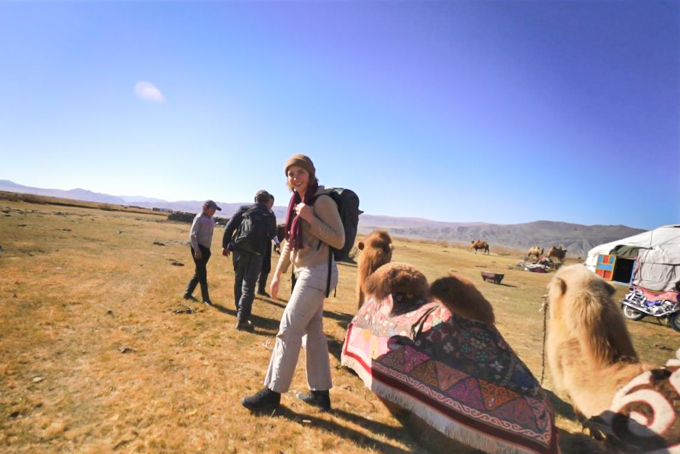
By making genuine connections with people who happen to be in the right industry, you’ll eventually get advice, connections, and a few ideas for your next steps. Work on a small portfolio of work that you could proudly present in case anyone ever asks. Be humble and accept small tasks as they start to come in. Start holding yourself to the standard that future clients would expect.
If you want to freelance online, start freelancing before you quit your day job. It might take you a while to start dependably earning money, so save at least 6 months’ worth of expenses before cutting off your revenue stream. Stay focused on the industry that you want to work in. It is better for you to not accept part-time jobs while you try to crack your desired niche.
[slogan]Every moment you spend on work that isn’t related to your dream job is taking you away from it.[/slogan]
At some point, you will probably spend just as much time slaving away at a project that you don’t care about working online from Chiang Mai as you would in a cubicle in Hartford. Things are always tough for beginners, and nothing replaces hard work. You are responsible for your own success, and you should always be reaching for more.
But I’m really just a beginner myself in the grand scheme here, so it’s possible I don’t know what I’m talking about. We’ll see!
See more of Brandon Li’s work at unscripted.com. Watch the trailer for our documentary, “American Soil, Chamorro Soul,” which premieres on Guam this week!
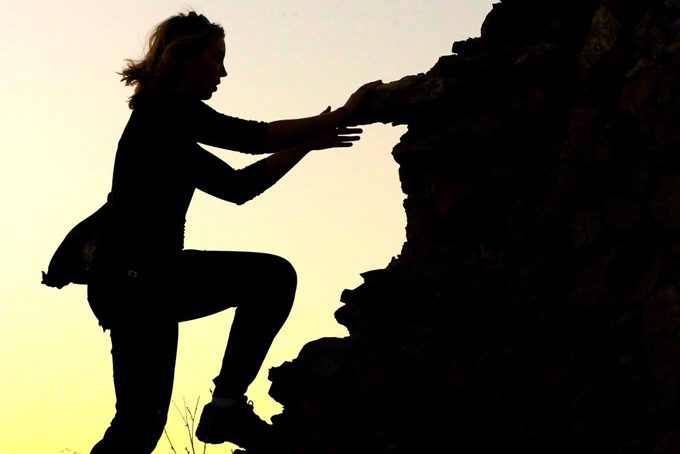
Comments 14
May 12, 2016 at 1:20 am
This was so encouraging! Thank you for sharing such an inspiring story.
May 31, 2016 at 11:50 pm
Thanks, Leah!
November 29, 2016 at 8:34 am
Interesting post! Love the images from Mongolia. I could not live the life of a digital nomad like Brandon, but it’s fun keeping up with his adventures. Thx for sharing.
December 5, 2016 at 10:35 am
Thanks for reading, Doreen.
December 1, 2016 at 9:30 am
Hats off to you for following your heart. Not everyone has the courage to leave behind the materialistic world and live with just a 55l backpack!!
December 5, 2016 at 10:35 am
Yes, Ansley is an adventurous soul!
December 2, 2016 at 10:26 pm
We can’t wait to see Mongolia. We love Dan Carlin’s Hardcore History podcast. His series on Genghis Khan was so vivid and dramatic and made us fall in love with that area. Your photos of the Mongolians today seem like there from another century. Very captivating.
December 5, 2016 at 10:34 am
Yes, I want to go too!
December 4, 2016 at 8:50 pm
Such a dedicated individual and a refreshingly real piece of writing.
I think it’s important that people realise how less glamorous the life of a travel blogger or photographer truly is!
December 5, 2016 at 10:34 am
Thanks so much, Chris.
December 5, 2016 at 9:02 pm
It is really very inspiring to read about Ansley and her thoughts. Loved the post. I watched the video about Mongolia and found it really fascinating. Great video.
December 6, 2016 at 5:50 am
This was such a thorough and introspective post about the DN lifestyle. I myself love the change but I also like to create some roots and feel comfortable, that is why I chose to live an expat life, which I guess can be similar to a nomad, it’s just that we stay at each location longer. But I admire your taste for the unknown and unpredictability, sometimes both can be scary and it is definitely not for everyone.
March 23, 2017 at 5:39 pm
So inspiring story and so fearless woman, against all the stereotypes that society keeps for women
March 27, 2017 at 1:00 pm
Thanks for reading, Latrakia.